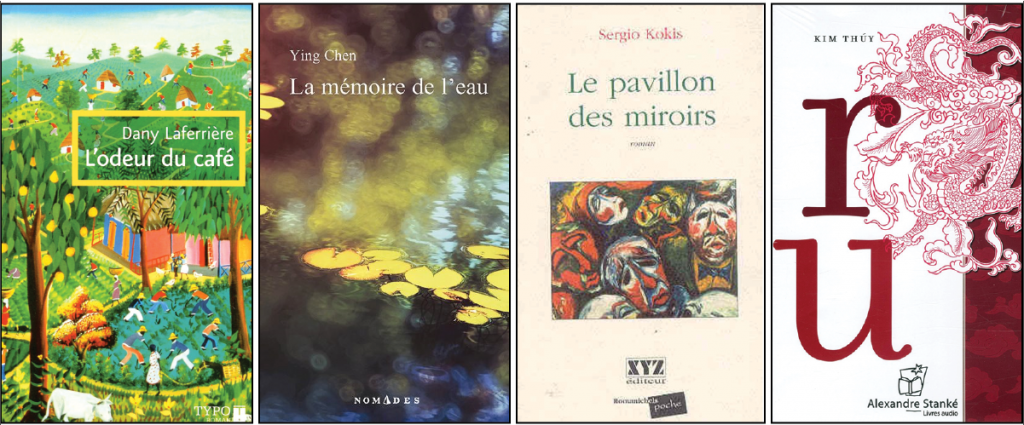Dr. Liza Bolen, former PhD student of French Studies, shares why her graduate student experience at UBC surpassed her expectations, and how her research on the five senses tackles an often overlooked aspect in literature studies.


Dr. Liza Bolen at the Rose Garden in UBC Vancouver campus.
“The opportunity to study in one of the top research institutions in the world, in one of the most beautiful cities in the world, was indeed very enticing.”
Graduate Student Experience
Why did you choose UBC for graduate studies?
The opportunity to study in one of the top research institutions in the world, in one of the most beautiful cities in the world, was indeed very enticing. In the past six years, UBC surpassed all of my expectations (which were high to begin with). I have been given so many opportunities to teach and to develop my teaching skills, to be actively involved in the wider community and in the local French-speaking community, to be a part of various committees, to organize conferences and to present in forums and in conferences. UBC is a particularly vibrant university and there are countless opportunities to learn and to evolve, regardless of your career goals.
As someone who is passionate about both teaching and doing research, pursuing graduate studies seemed like the best thing I could do. And I must say, I am so glad I decided to do this!
What advice would you give to people who are discerning whether graduate school is for them?
The best thing about graduate studies is how flexible it is, and how it allows you to grow both personally and professionally in the process.
When I started the program in 2014, I could have never imagined it would have such a deep impact on my life. The experience I have acquired through teaching, tutoring, academic service, community involvement as well as research is huge! I think it’s important to be aware of this when thinking about going into graduate studies. Being a graduate student is being a multitude of things. This will inevitably help you develop an amazingly varied skillset that will be beneficial to you, regardless of the path you chose to follow after your studies.
… And at the risk of sounding a bit cheesy, I have to say that the people at the Department of French, Hispanic and Italian Studies (instructors, staff, graduate students, professors, advisors) are incredibly generous and kind. If you are reading this and are thinking of applying to one of our programs, or if you are about to start, feel free to reach out and ask your questions.
What was working with your graduate supervisor like?
My graduate supervisor was Professor André Lamontagne, who is possibly one of the kindest and most patient people I have met in my life.
I admire him for his research, for his work as an author and for his great involvement in the French-speaking community in British Columbia. Having the opportunity to work with someone so accomplished in so many areas is truly inspiring, and it makes me strive to be more involved in the academic community and in the wider community. Also, seeing how I was teaching while I was working on my dissertation, I really appreciated Professor Lamontagne’s guidance and flexibility, which helped me stay balanced throughout the entire process.
What are your career goals?
Having just defended my doctoral dissertation in April 2020, I am looking forward to exploring more areas of my research and continuing to teach as well. Although the current situation with COVID-19 makes for uncertain times, I am hopeful that I can remain active with research. For now, I am also motivated to keep learning and adapting as and instructor, and to find ways to innovate and develop fresh ideas for the virtual classroom.
Research


L’Odeur du café by Dany Laferrière, La Mémoire de l’eau by Ying Chen, Le Pavillon des miroirs by Sergio Kokis, and Ru by Kim Thúy.
What is your research topic?
My research focuses on the role of the five primary senses — sight, touch, hearing, smell and taste — in narrative forms.
More specifically, in my doctoral dissertation titled Écritures migrantes et mémoire sensorielle dans le roman québécois contemporain : Ying Chen, Sergio Kokis, Dany Laferrière et Kim Thúy, I examined how memories associated with the five senses were used in the works of “migrant” writers and how they impact the way the story is told.
What drew you to this area of interest?
It seems as though, in literature, the senses are often overlooked. Yet, they represent something we all share.
Like Proust, we can all think of a time when a smell transported us back to a specific memory, a specific moment of our lives, and the same can be said about a song, a sensation, a color or a taste. Sensory impressions are both universal, and ineffably personal.
I was drawn to the four novels I studied in my dissertation — La Mémoire de l’eau by Ying Chen, Le Pavillon des miroirs by Sergio Kokis, L’Odeur du café by Dany Laferrière and Ru by Kim Thúy — in large part because they used the senses in a way that was incredibly appealing. This made me interested in examining how the senses were used in narrative forms and what research had been done about this topic.
As I started looking into this, I realized there weren’t that many publications pertaining to the subject in literature. I found this very motivating and exciting. With this research, I hope to have an impact and contribute to what I hope will be an emerging field in the coming years.
What questions do you address through your research?
I’m very curious about the impact that the senses have on ways of retelling childhood memories, describing space, and how they can alter the temporality of the novel.
In my doctoral dissertation, I divided my research into two parts: the quantitative analysis and the qualitative analysis. In the quantitative part, I isolated and analyzed each word or expression that was used to explicitly describe the senses. Then, in the qualitative part, I could use the data I had collected to guide my focus and to create dialogues between the four novels in my corpus.
Using this two-step process has enabled me to get more specific answers to my research questions, and to touch upon further issues that appeared during the text analysis. In fact, despite having finished my dissertation, I still have many questions and there are indeed many things I would like to explore more. I think this is a good sign! I definitely have a lot of projects in mind at the moment.
How does your research impact the wider community?
feel that my research is significant because it can act as a reminder of the many possibilities that exist in literary studies.
There seems to be a growing interest for this specific field at the moment, which I find incredibly stimulating and also quite serendipitous. I truly hope I can play a role in the emergence of the senses as a tool for studying literature.
My dissertation touches upon various aspects of literary theory and narratology, but it also examines areas of cognitive science, psychology, and computer-based text analysis. I believe that using literature to dialogue with other disciplines is a way of having a very rich and meaningful impact in the research community.


